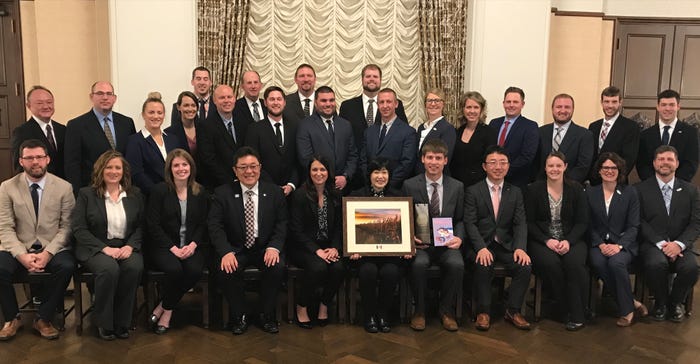
The Iowa Corn Leadership Enhancement and Development program is a two-year learning opportunity for people who want to become the next generation of leaders for Iowa agriculture.
The Iowa Corn Promotion Board and the Iowa Corn Growers Association started the program 16 years ago to help develop new leaders who will advocate for agriculture and rural communities.
Men and women involved in production agriculture, the food and agriculture industry, ag media, or education and government are all encouraged to apply. Iowa Corn is now accepting applications for I-LEAD Class 9. Deadline to apply is July 1. Contact Alyssa Johnston at [email protected] or visit iowacorn.org/ilead.
The classes meet several times each year during the two-year period. They also visit ag industry facilities, listen to expert speakers and learn from each other. Each class participates in an international trade mission.
Aspiring leaders visit Japan, Vietnam
Members of I-LEAD Class 8 traveled to Japan and Vietnam on their trade mission in March. The trip’s purpose was to gain a greater understanding and appreciation of the global food system and to learn about the views of U.S. agriculture’s international customers. The mission served as the capstone event as Class 8 wrapped up its two-year program.
“Participating in I-LEAD was a once-in-a-lifetime opportunity for me,” says T.J. Page, a member of I-LEAD Class 8. “I would absolutely recommend it to anyone. I grew both personally and professionally from the experience. During the mission, we discovered how important agriculture is to each of these countries and what these nations import and export with the United States. We saw firsthand the work of the U.S. Grains Council and the U.S. Meat Export Federation, and how their market development activities benefit from the Iowa Corn Promotion Board’s investments.”
Class 8 began its journey in Vietnam with a briefing from a USDA Foreign Agricultural Service representative about the importance of Vietnam to U.S. ag exports. Page says you could see that Vietnam is a market ready to expand.
Learn firsthand about customer needs
“Outside of China, Vietnam is one of the fastest-growing economies, and with additional economic prosperity, there will come an even greater need for protein there,” Page says. “It is estimated by the year 2050, Vietnam’s population will increase by 40 million, and currently 60% of family income in Vietnam goes to food. They buy food daily as there is very little cold storage. There is also a huge market potential for U.S. ethanol in Vietnam. The sheer number of mopeds in South Vietnam was amazing. They cause 30% more emissions than a standard vehicle, and you see people wearing masks because of the air pollution. That’s a fantastic opportunity for using ethanol, which is cleaner-burning than gasoline.”
Vietnam buys about $3 billion in U.S. ag products every year. That number is expected to increase as the country’s population grows and citizens gain more wealth. Vietnam has signed onto the Trans-Pacific Partnership trade agreement, so this will put the U.S. at a possible disadvantage with other competing countries exporting products to Vietnam.
The I-LEAD class toured the Interflour port to see where bulk ships of imported grains offload into Vietnam. Vietnam buys about 8 million metric tons of corn and 1.2 million metric tons of distillers grain every year. The class visited an ethanol plant outside of Ho Chi Min City. In 2007, Vietnam passed an E5 ethanol mandate but has been in a trial period until 2018. The class had dinner with grain buyers from Vietnam. They discussed the opportunities and challenges the grain buyers face when importing corn.
Trade policy discussed
“The trade mission to Vietnam provided our class members an opportunity to meet with grain buyers and explore the region’s food, feed and fuel needs,” says Roger Wuthrich, an ICGA director from Bloomfield. “We gained insights about Vietnam’s ethanol industry and opportunities for them to increase their ethanol blends.”
The next stop on the trip was Japan. I-LEAD Class 8 traveled to Tokyo, which has the third-largest GDP in the world, and a population of 130 million people. However, due to its aging citizens, the population is expected to decrease to 90 million people by 2060. The Iowa class also learned that Japan has an open trade policy and has trade agreements with many of the countries that compete with U.S. agriculture in the world marketplace.
“We can learn a lot from Japan’s culture, the respect they convey to one another and the cleanliness of their cities,” Page says. “History and culture are extremely important to the Japanese people. It was important for us to gain an understanding of the culture before meeting with leaders of Japanese companies.”
Establishing relationships
The class explored the AEON supermarket to understand how corn and meat products are sold in stores. Page says Japanese shoppers recognize U.S. products on the store shelves and will pay more for quality products. He says U.S. products have a good reputation for quality in Japan.
The I-LEAD class also traveled to Yamanashi Prefecture and visited with the vice governor of that state. Following a typhoon that hit Japan in 1959, Iowa sent hogs and corn to help the residents of Yamanashi. The residents, grateful for the U.S. aid, formed a sister-state relationship with Iowa, which has lasted ever since. The class learned about this longtime relationship on their visit.
One of the final stops in Japan included a tour of an agricultural high school. Half of the high school graduates will attend college and the other half will enter the workforce. “Our I-LEAD team members showed the students photos of their Iowa farms, and the students were amazed at the size of the farming operations in Iowa,” Page says. “Likewise, we were impressed by the students, especially their high-tech classrooms and their student-run ice cream shop business.”
While on the trade mission, the I-LEAD Class 8 members blogged about their experience. You can view the blog at iowacornstalk.com.
About the Author(s)
You May Also Like




